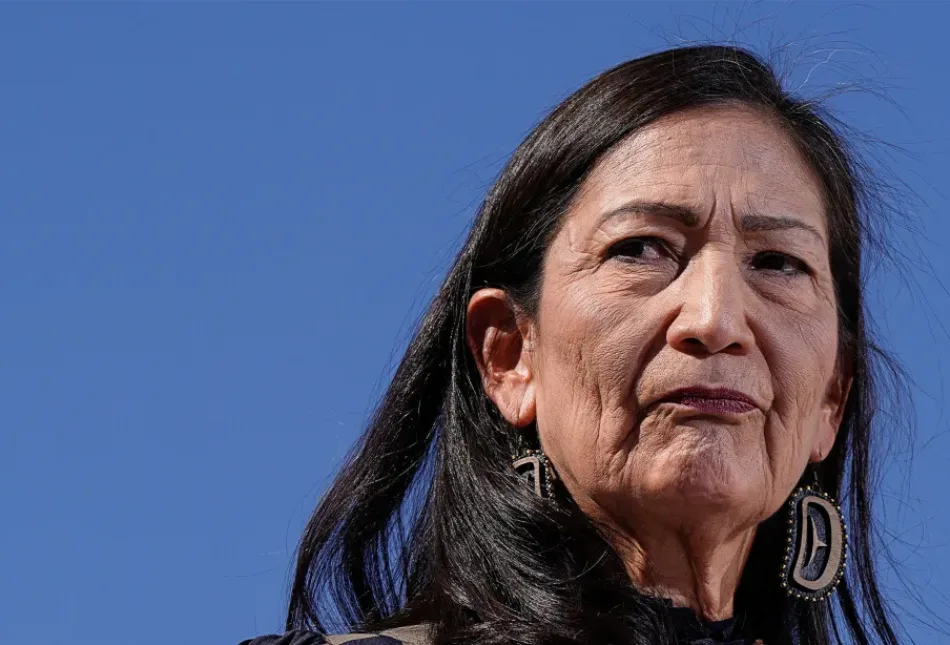RGF in National Review: As Governor, Deb Haaland Would Double Down on New Mexico’s Failures

The following appeared at National Review Online on Friday, February 21, 2025.

Democrat Deb Haaland recently announced her candidacy for governor of New Mexico. Haaland was most recently secretary of the interior under Joe Biden. She previously served as the U.S. representative for New Mexico’s first congressional district (Albuquerque area) from 2019 to 2021 and as chair of the New Mexico Democratic Party from 2015 to 2017. Haaland is a registered member of the Laguna Pueblo of Native Americans.
That last part of her biography, being a Native American, is why she has moved up the Democratic Party ladder in New Mexico. Even from an honest left-wing perspective, Haaland’s rise has little to do with achieving anything significant in her recent positions of power. Rather, her rise is attributable to her ethnic background and her reliable support for left-wing policies.
During her one full term in Congress, she rated an “F” by the National Taxpayers Union (also here). In Congress, she supported boondoggles like the “Green New Deal” and opposed fracking on federal lands. Nothing in her congressional track record stands out as particularly thoughtful, nor did she deviate from the typical government-first approach of modern “progressives.” She was just another hard-left vote.
Perhaps more notable than any vote or legislation, while in Congress Haaland said that students from Covington Catholic High School had displayed “blatant hate, disrespect, and intolerance” when they were confronted by a radical left-wing activist after a pro-life march in Washington, D.C.
A lawsuit brought by student Nick Sandmann (a student who was unfairly pilloried and labeled a racist by numerous media outlets) against CNN was settled for $275 million. A similar libel lawsuit brought by students of the school that called Haaland’s words “false and defaming” was dismissed on the grounds that her statements were made in the scope of her employment as a legislator.
Armed with a nondescript but reliably left-wing record in Congress and her identity as a Native American, Haaland was chosen by the Biden administration with the express purpose of her becoming the first Native American cabinet secretary and by definition the first Native secretary of the interior).
The Interior Department includes both the Bureau of Indian Affairs and Bureau of Indian Education, which of course further led to the Biden administration’s desire to place Haaland in this critical role. But Interior is a sprawling government agency that includes numerous swaths of federally managed lands including those under the Bureau of Land Management (BLM).
The BLM oversees more than 247.3 million acres of land, or one-eighth of the United States’ total landmass. The agency manages the federal government’s nearly 700 million acres of subsurface mineral estate located beneath federal, state, and private lands severed from their surface rights by the Homestead Act of 1862. Most BLM public lands are located in Western states including my home state of New Mexico, where the BLM is the largest land manager in New Mexico, managing 13.5 million acres.
With the Biden administration having pledged to attack the oil and gas industry at every opportunity, Deb Haaland as interior secretary was thus placed in a position to carry out the anti-energy policies of the administration — even if that meant attacking the economy of her home state.
As secretary of the interior, Haaland controlled access and leases and permits for oil, gas, coal, mining, timber, and ranching. In 2022, oil and gas produced from federal lands accounted for about 11 percent of U.S. oil and 9 percent of U.S. natural gas. Increasing production on those lands is one of the simplest tools the federal government has available to address prices at the fuel pump. But as prices at the pump rose rapidly under the Biden administration, Haaland instead attempted to squash American energy at every turn.
There are numerous cases of Haaland’s anti-energy approach, but one fascinating case was her denial of oil and gas development at Chaco Canyon National Historical Park in New Mexico. Haaland arbitrarily imposed a massive 10-mile buffer zone around the park. Thanks to Haaland (and Biden of course), federal oil and gas leasing is now prohibited in this 336,400-acre area.
While non-Natives and many living outside New Mexico may be under the impression that policies supported by one group of Natives would automatically be supported by others, that is not the case. In fact, Haaland’s Chaco radius was unpopular with significant numbers of Navajo tribal leaseholders in the area.
Many Navajo who preferred economic development and the financial benefit of leasing their mineral rights protested Haaland’s move. In fact, when Haaland arrived in the area for a photo op, her motorcade was blocked and the event was canceled.
What would a Haaland governorship mean for New Mexico? Simply put, it would be a disaster. New Mexico already suffers from nearly a century of misguided “blue state” governance. Since 1930, Republicans in the state have never held both houses of the legislature and the governorship at the same time.
Despite being the second-leading producer of oil in the nation after Texas, New Mexico is one of the poorest states. Little in the way of economic reform or tax reduction has taken place despite multibillion-dollar state budget surpluses in recent years. New Mexico has also ranked dead last in the National Assessment of Educational Progress (“the nation’s report card”) for two cycles running (2022 and 2024) despite rapid growth in education spending. Crime is a serious issue, as is broader dependence on government and the nation’s highest percentage of Medicaid recipients in the nation.
Sadly, Haaland would likely be even more aggressive than current Governor Michelle Lujan Grisham in doubling down on all the things that have made New Mexico an impoverished, slow-growing outpost in the American Southwest.
Paul Gessing is president of New Mexico’s Rio Grande Foundation, an independent, nonpartisan, tax-exempt research and educational organization dedicated to promoting prosperity for New Mexico based on principles of limited government, economic freedom and individual responsibility.
